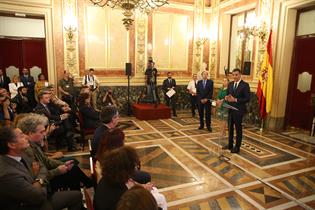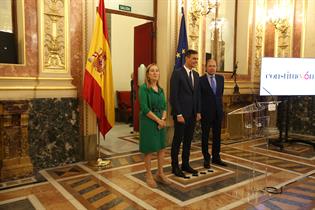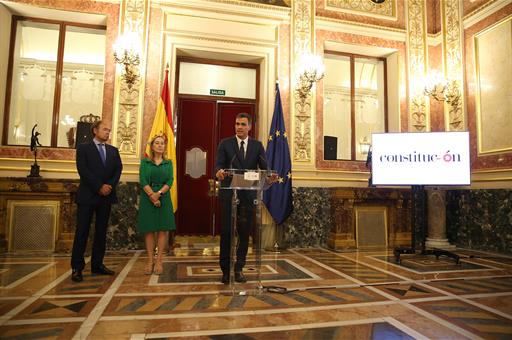Presentation of the main commemorative events for the 40th anniversary
40th anniversary of the Spanish Constitution: 40 years of democracy, 40 years of freedom
President's News - 2018.9.6
Lower House of Parliament, Madrid
As she opened the presentation, the Speaker of the Lower House of Parliament, Ana Pastor, said that "commemorating the Spanish Constitution means celebrating our reconciliation, our freedom and our progress. The option to take that path was only made possible by the decision from generous leaders and the people of Spain as a whole, who consciously opted for harmony and wisely placed social peace above political and ideological interests".
"We want this commemoration to highlight the value and significance of that pact between Spaniards, and for it to serve as a launchpad for renewing our commitment to social harmony and our main democratic principles", she added. "That desire to live together in the spirit of the Spanish Constitution has brought us many, very many positive things, and reflects our commitment to continue down that path towards building an increasingly better Spain", she said.
The Speaker of the Lower House of Parliament went on to say that "those of us here today are all proud to be celebrating this 40th anniversary, reaffirming our commitment to the Spanish Constitution. The people of Spain also decided to make a commitment to a modern Spain, a Spain within Europe and relevant from a global perspective. A Spain of rights, freedom, well-being, development, and political, social and cultural pluralism".
A guarantee of rights, freedoms and progress as a society
"With this commemoration, we want to celebrate all that of which we Spaniards are proud of. Proud of the history made over these 40 years; proud of our ancestors but, above all, proud to tell our young people that this was all possible thanks to the generosity of many and that the success from these 40 years is a success that can be claimed by all Spaniards; it is the undeniable evolution of Spain over the last 40 years and it cannot be denied that everything was made possible because the people of Spain opted for democracy and the rule of law", she said.
Ana Pastor then stressed that this 40th anniversary commemoration gives us the opportunity to lay the foundations for a number of cultural and participatory initiatives that will help foster the values of our Spanish Constitution among young people and society in general.
"This is a celebration that belongs to all Spaniards. Any initiative embracing that same spirit of pride over the past and hope in a future together will be welcome at this commemoration. Because we Spaniards, all of us, have in the Spanish Constitution a guarantee of our rights, our freedoms and the progress as a society to which we all aspire", she concluded.
Activities for celebrating 40 years of the Spanish Constitution
 Pool Moncloa/Fernando CalvoThe Speaker of the Lower House of Parliament announced a few of the activities being organised to commemorate the 40th anniversary of the Spanish Constitution during the final months of this year. On 17 September, an exhibition by Agencia Efe entitled "40 Years of Spain under Democracy" will be opened at the Carrera de San Jerónimo. On 4 and 5 October, an International Constitutional Congress will be held at the Upper House of Parliament.
Pool Moncloa/Fernando CalvoThe Speaker of the Lower House of Parliament announced a few of the activities being organised to commemorate the 40th anniversary of the Spanish Constitution during the final months of this year. On 17 September, an exhibition by Agencia Efe entitled "40 Years of Spain under Democracy" will be opened at the Carrera de San Jerónimo. On 4 and 5 October, an International Constitutional Congress will be held at the Upper House of Parliament.
In late November and in partnership with the Reina Sofía Museum, an exhibition entitled "The Power of Art" will be hosted by the Lower House of Parliament, the Upper House of Parliament and the museum itself.
As the culmination of these activities, a commemorative concert presided over by the King and Queen of Spain will take place at the National Auditorium on 5 December, at which a musical piece composed by a Spanish composer specifically for this commemoration will be presented. On 6 December, Spanish Constitution Day, an institutional event by Parliament will be held at the Lower House of Parliament and given extraordinary status on occasion of this anniversary.
Rule of law and internal plurality
In turn, the Speaker of the Upper House of Parliament, Pío García-Escudero, highlighted the need to underline the vitally important nature of the Spanish Constitution in terms of freedom, democracy, fundamental rights, the rule of law and political recognition of the essential internal plurality of Spain within its unquestionable unity as a nation.
"We particularly value the fact that the current Government of Spain, through its President, is renewing its commitment to this commemoration on this day, which had already been expressed by the previous government. All the State powers and public authorities should work together, because we are all essential to the realisation of the fundamental goal sought by this commemoration: to defend, respect and promote the principles and values of our constitutional text", he added.
The Speaker of the Upper House of Parliament stressed "such core principles as that of separation and balance of powers within a loyal spirit of cooperation. It shouldn't be forgotten that ours is a parliamentary democracy and that, as such, Parliament should always hold a core position in Spanish political life".
The Speaker of the Upper House believes that "we can pay no better tribute to our Constitution, to its spirit, than by protecting, respecting and, as far as possible, enhancing the political role and duties of our Parliament, both the Lower House of Parliament and the Upper House of Parliament".
Consolidation of democracy and joining the EU
The President of the Government, Pedro Sánchez, highlighted the symbolism of the event because of its purpose and the framework surrounding the celebration; Parliament, the seat of popular sovereignty. He went on to stress that, since the Spanish Constitution was approved, progress in Spain was accelerated by that full democracy. He said that was only possible thanks to the overwhelming support from the majority of people, the members of parliament at the time and especially those responsible for drawing up the Constitutional text itself.
 Pool Moncloa/Fernando Calvo"That was no simple task", he said, "and, looking back now, we should be capable of appreciating that in order to explain to future generations all that it was possible to build using the power of words and the pursuit of agreement. It was a lesson in generosity from which we are still learning today".
Pool Moncloa/Fernando Calvo"That was no simple task", he said, "and, looking back now, we should be capable of appreciating that in order to explain to future generations all that it was possible to build using the power of words and the pursuit of agreement. It was a lesson in generosity from which we are still learning today".
He believes that the last 40 years have shown that "they got all the main issues right, as well as others that seemed secondary at the time". The Spanish Constitution consolidated democracy and Spain's entry into the European Union. "We beat terrorism with the Spanish Constitution; we discovered the benefits of self-governance through the Spanish Constitution; and we developed the fundamental rights and inspirational principles of the Welfare State we still enjoy today under the Spanish Constitution", he said.
Underpinning the foundations of Spain
In his opinion, more is being commemorated than merely the 40th anniversary of a legal text. "We are commemorating a framework that has enabled us to understand one another from a position of diversity, encouraged social harmony and underpinned the foundations of Spain. The Spanish Constitution allows the exploration of pathways towards agreement, it allows the achievement of major consensus provided that we are capable of the necessary dialogue while understanding one another from a position of generosity and avoiding personalism", he said. He also underlined the value and spirit of dialogue for conquering what is to come and said that "the Spanish Constitution should be honoured and commemorated, complying with and enforcing its content".
Pedro Sánchez recalled that the spirit of 1978 spawned a Spain that is open to the world, a pioneer in the defence of such universal values as feminism, human rights and civil liberties, and that "from that we learned that no political project should ever again seek to divide society into two halves condemned to disown one another".
The President of the Government believes that "one cannot govern for only half of the population. One cannot unilaterally alter the framework of social harmony that we all built for ourselves and protects us all. One cannot repeatedly ignore the other party. We are going to make this commemoration an opportunity to re-tell to the rest of the world what it already knows about Spain".
He stressed that Spain is a country that "embraces the noblest of causes of our times" and that it does so from a standpoint of freedom, pluralism and respect for human rights, a Spain that is committed to Europe, and is diverse, feminist, open, cosmopolitan, entrepreneurial, solidarity-based and fair. A modern society that wishes to see itself reflected in the value of words and the spirit of dialogue, as was the case in 1978", he said.
Eye-witnesses of history
 The Government of Spain is playing an active part in commemorating this 40th anniversary and Pedro Sánchez explained that events will be held in which the public will play a fundamental role, such as those related to the role of women during these four decades of democracy and others related to the important position held by Spain within Europe and Ibero-America.
The Government of Spain is playing an active part in commemorating this 40th anniversary and Pedro Sánchez explained that events will be held in which the public will play a fundamental role, such as those related to the role of women during these four decades of democracy and others related to the important position held by Spain within Europe and Ibero-America.
The President of the Government introduced a video with a clear message of reconciliation through two very special people who have already witnessed and featured in the last century of history in Spain. Germán and José fought on opposing sides 80 years ago. 40 years ago, they were given the chance to vote for the Spanish Constitution. Today, happily, they can still celebrate it with us.
José Mir Salas, from Mequinenza in Zaragoza, is 98 years old and served in the People's Republican Army, while Germán Visús lives in Fayón, also in Zaragoza, is 102 years old and belonged to the Spanish Army. The two men fought at the Battle of the Ebro, which began 80 years ago last July. José Mir formed part of what was called the "Quinta del Biberón" [young soldiers called up to fight for the Republic during the Spanish Civil War]. Two combatants from the Battle of the Ebro who fought on opposing sides and today chat politely and without resentment, reliving different moments of a single story.
The video was recorded with help from the Mayor of Mequinenza, Magdalena Godía, the Mayor of Fayón, Roberto Cabistany, Director of the Battle of the Ebro Museum, José Miguel Ferragut, and the families of the two former combatants.
Non official translation





